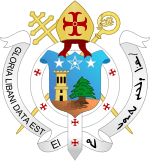Maronite Cypriots
The Maronites in Cyprus are members of the Maronite Catholic Archeparchy of Cyprus whose ancestors migrated from present-day Lebanon during the Middle Ages. A percentage of them traditionally speak a dialect which is a combination of Arabic, Turkish and Greek, recently recognised as variety of Arabic in addition to Greek. People speaking this Arabic dialect originate from one village, specifically Kormakitis. As Eastern Catholics of the West Syriac Rite, they are in full communion with the Catholic Church of Rome.
| Part of a series on |
| Maronite Church |
|---|
 |
| Patriarchate |
| Religious orders and societies |
| Communities |
|
| Languages |
| History |
| Related politics |
|
|
As of 2018 the Archbishop of Cyprus was Youssef Soueif, born in Chekka, Lebanon on 14 July 1962. He was ordained Archbishop on 6 December 2008 at the Basilica of Our Lady of Lebanon-Harissa by the Patriarch Cardinal Nasrallah Boutros Sfeir. The Mass of Enthronement was held at the Maronite Cathedral of Our Lady of Graces in Nicosia, Cyprus on 21 December 2008. He succeeded the Emeritus Archbishop of Cyprus Boutros Gemayel, who lives in Lebanon.
Legal status
Legally defined in the Constitution of Cyprus as a religious group within the Greek Cypriot community, which they chose to join by vote just before independence alongside their fellow Roman Catholics of the Latin Rite and the Armenians. While Maronites are part of the Greek Cypriot electoral register when voting for president and members of the house of representatives, they also vote for a special representative that is not an MP but corresponds to the now non functioning communal chambers of the Greek and Turkish communities.[1]
Demographics
In the 13th century there were about 50,000 Maronites in Cyprus, living in 60 villages, a number that dropped down to 33 before the Ottoman conquest in 1571. The number of Maronites kept declining through the Ottoman rule; 19 Maronite villages were recorded in the 15th century and the number had fallen to 9 by 1661. The 1841 Ottoman census gave a figure of 1,200–1,300 for the Maronite population. In the 1891 census, out of 209,286 Cypriots 1,131 were Maronites, the figure rose to 1,350 in 1921 and 1,704 in 1931.[2] In the 1960 census they were 2,752, in four villages all situated in Northern Cyprus, occupied from 1974 by Turkey. Their present estimated population is about 6,000, of whom 150 live in the north.[3] 75% of Maronites live in Nicosia, 15% in Limassol, and 5% in Larnaca. Until the Turkish invasion of 1974, the town of Kormakitis was known as a centre of Maronite culture, but according to United Nations estimates only 165 Maronites remained in Northern Cyprus in 2001.[4]
See also
- Cypriot Maronite Arabic
- Lebanese Arabic
- Lebanese people in Cyprus
- Greek Cypriots
- Maronite Church
- Roman Catholicism in Cyprus
- Human rights in Northern Cyprus
References
- "Minority Languages in Education on Cyprus and Malta". Mercator-Education. Ljouwert/Leeuwarden: European Research Centre on Multilingualism and Language Learning. Archived from the original on 13 February 2010. Retrieved 11 February 2010.
- Altın, Işıl; Keser, Ulvi. "A Cross-Sectional View of The Forgotten Peace Ambassadors of TRNC; Maronites and Things That Were Done and Could Not Be Done" (PDF). Motif Academy Journal of Ethnology. Retrieved 8 March 2015.
- Mirbagheri, Farid (2010). Historical dictionary of Cyprus. Scarecrow Press. ISBN 9780810855267.
- Spinthourakis, Julia-Athena; et al. (November 2008). "Education Policies to Address Social Inequalities: Cyprus Country Report" (PDF). Department of Elementary Education. University of Patras. p. 4. Archived from the original (PDF) on 20 July 2011. Retrieved 11 February 2010.
External links
